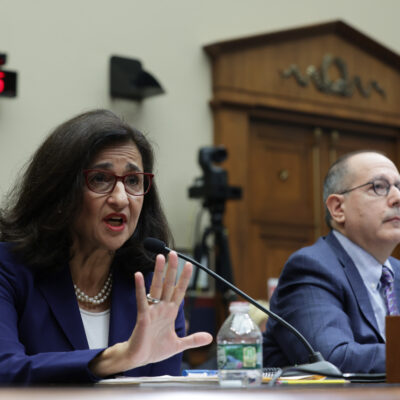Dictionary.com changes antisemitism spelling away from ‘anti-Semitism’
The online reference service waded into a national debate about the evolving nature of language with its decision to alter the spelling, but not definition, about antisemitism

Getty Images
Amid an ongoing national conversation about the evolving nature of language, one of the biggest online dictionaries is changing its official spelling of the word used to describe what it defines as “discrimination against or prejudice or hostility toward Jews.”
Dictionary.com is replacing “anti-Semitism” — written with a hyphen and a capital-S — with “antisemitism,” the website’s senior director of editorial, John Kelly, told Jewish Insider on Monday. The term’s definition will not change.
“As a dictionary, we take pains to document and describe the language that’s being used,” Kelly said. “How a word is present in a dictionary has real effects on real people in the real world. The effects can be social, it can be psychological, it can be personal.”
The move comes nearly two years after The Associated Press similarly changed the spelling in its widely used style guide. It also reflects an ongoing push by many American Jewish organizations to spell “antisemitism” without the capital S. The linguistic debate kicked off in earnest in 2015, when the International Holocaust Remembrance Alliance published a memo arguing for the updated spelling. Using the capital S, the memo said, “allows for the possibility of something called ‘Semitism.’”
The Anti-Defamation League suggests that “there is no such thing as a Semitic peoplehood,” only Semitic languages, including Arabic and Amharic — and notes that it is possible to speak a Semitic language and still be prejudiced against Jews. Since the term was popularized in the late 19th century by a German journalist who espoused conspiracy theories about Jewish people, it has “referred to prejudice against Jews alone,” and not against any other “Semitic” entity, IHRA writes.
“It’s quite important to note that ‘antisemitic’ as we use it in our general culture isn’t noting a prejudice against, say, somebody who speaks Aramaic. It is noting a very particular prejudice, which is discrimination against or prejudice or hostility towards Jews in particular,” said Kelly. “The capital S spelling in Semitic is, by a number of groups, interpreted as reinforcing some outdated pseudo-science of race that has kind of applied to Jewish people.”
Supporters of the change argue that it serves an educational purpose, of clarifying what, exactly, antisemitism is — and what it is not. But others in the Jewish community fear that it offers what looks like an easy way out while doing little to actually combat antisemitism. Deborah Lipstadt, a Holocaust historian and the State Department’s special envoy to monitor and combat antisemitism, argued for the updated spelling in her 2018 book, Antisemitism: Here and Now.
“It’s understandable that those looking for a win against a seemingly intractable prejudice such as anti-Semitism would gravitate toward this issue. But the time and energy spent on this subject would be much better spent on combatting anti-Semites and educating allies,” journalist Yair Rosenberg wrote in The Atlantic in 2021.
Dictionary.com is making the change now due to the growing number of recent antisemitic incidents in the U.S., Kelly explained. “The reason that this particular time became increasingly urgent was because of the fact that the term was getting used via reporting on antisemitic incidents,” he added.
Unlike The Associated Press or The New York Times, which also now uses the spelling “antisemitism,” Dictionary.com is a reference tool. For hundreds of years, dictionaries were massive physical books that, once they were in a bookshelf in someone’s home, could not be edited.
But dictionaries now are also online, and they are crucial arbiters of trendlines and changing fads — and how language should keep up with them, or how it should resist modern changes.
“We call our approach in dictionary making, and in linguistics more generally, descriptive-ism,” said Kelley. “It’s really important to be a descriptive dictionary to reflect language as people are using it.”
The decision by Dictionary.com follows a years-long evolution of the English language that sped up following the 2020 racial justice protests in the U.S. Dictionary.com, like many other reference sites and media outlets, updated its official entry for the word “black” — used as a racial category — to be spelled “Black,” with a capital B. Other changes have reflected the linguistic styles of other marginalized communities like Native Americans and LGBTQ people.
“These words that truly touch people at their core, it’s absolutely critical that we, as a dictionary, get it right,” said Kelley, and that Dictionary.com take note of “groups who have been oppressed, who have been left out, who haven’t been given a voice in the same way — to make sure that we listen to them as a stakeholder into how we define a term, down to the spelling.”









